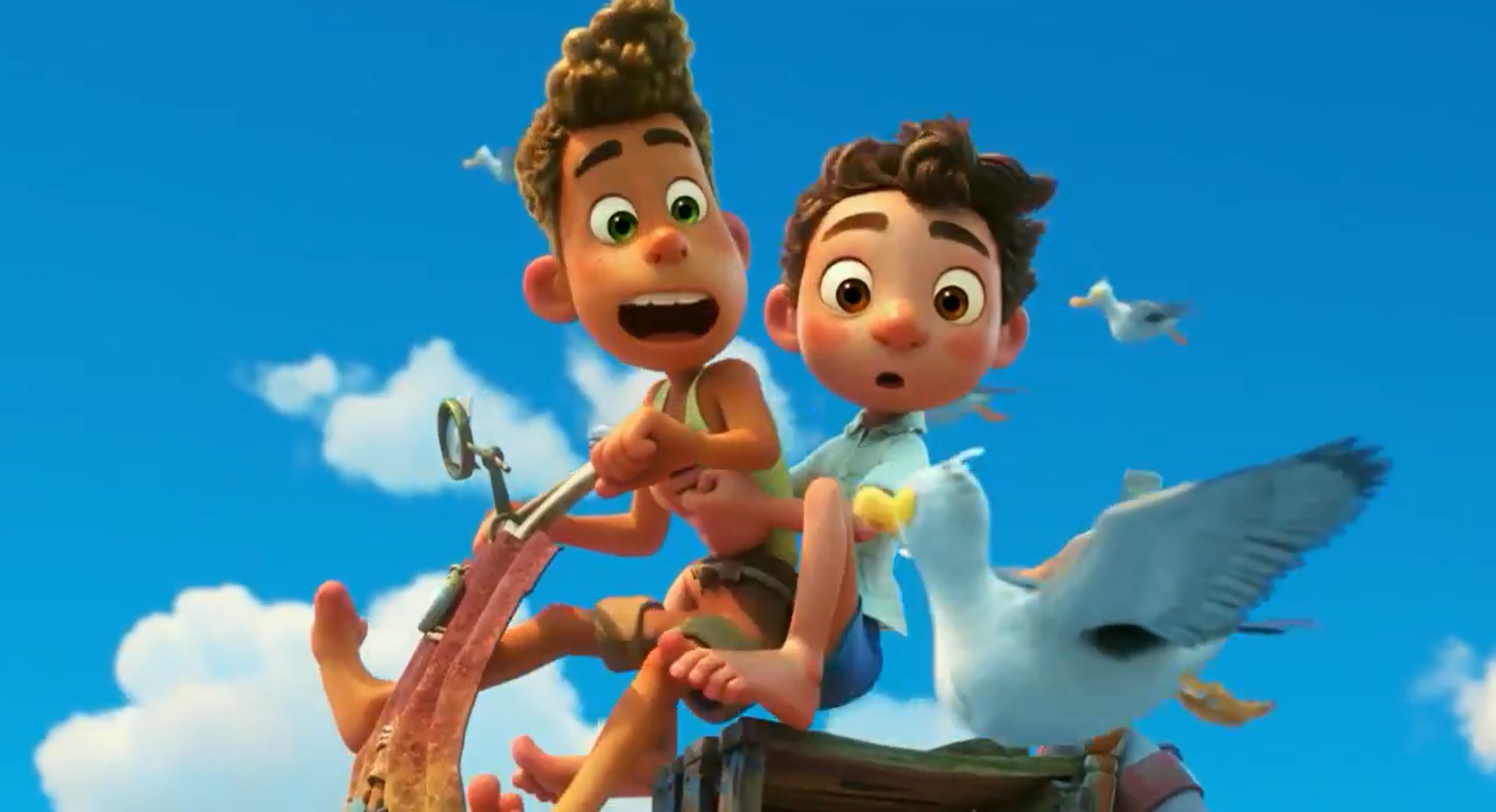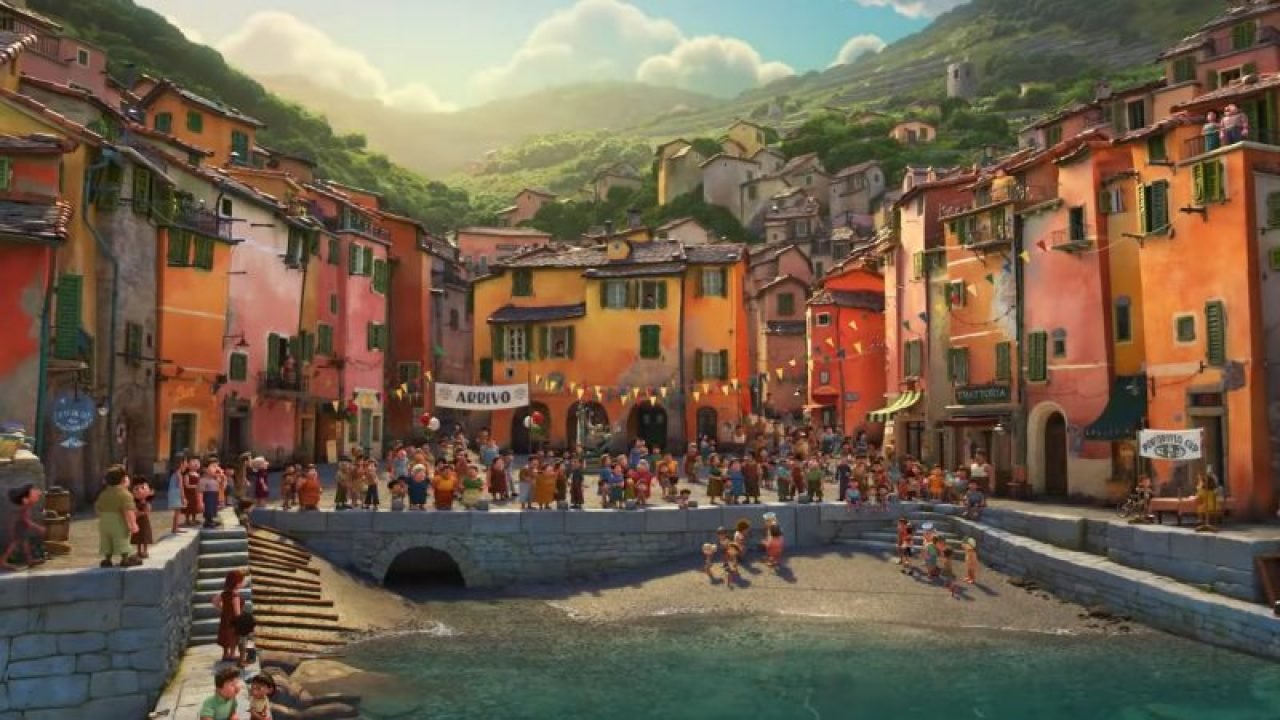Pixar should just own up to it when they’ve made a lighter, “lesser” movie. Their formula – delight, thrill, provoke tears, rinse, repeat – is quite a good one, and it’s produced some of the very best in animated features over the past quarter century. But not every film out there can or should have the grand stakes of their most ambitious works, where the very fate of a human soul is in the balance. (Those are the type of grand stakes usually suitable for a kids movie, rather than Thanos snapping half of the universe out of existence.) Some films should just be a fun Mediterranean romp, like Luca.
Luca might be a bit more fun if it didn’t try so hard to achieve the endgame, so to speak, of all its predecessors, which is to leave us blubbery messes pining for our inner child or contemplating life’s most delicate beauties. However, it’s still quite fun. The gusto of the animators, as they conjure a seaside Italian village and all its denizens, is plenty contagious.
A pretty original entity not directly indebted to any existing Pixar template, Luca follows the adventures of a pubescent sea monster (Jacob Tremblay) off the shores of Portorosso, the fictional Italian village that’s just about the Platonic ideal of a cobblestone coastal paradise. The title character doesn’t see the village for a while, though, as he’s been told by his parents that the surface contains untold dangers, and he should never go there. But as he collects little bits of ephemera that have fallen out of the boats above, his curiosity mounts, until he follows another sea monster about his age up to the surface and beyond.
Like Madison in Splash before him, Luca takes human form when he’s on dry land. Able to blend in with the “surface monsters” who populate the town, he and his new bestie Alberto (Jack Dylan Grazer) explore their new surroundings, entertaining an array of new ambitions. Alberto explains that a Vespa is the world’s finest creation, and they fashion their own out of available discarded materials, racing it down a hill into the water – even though Luca knows he should get back soon, so as not to arouse the suspicion of his parents. But a Vespa constructed from spit and roofing materials is not really enough to travel among the stars – which Alberto calls the fish in the sky – and they realise that winning the town’s local bike race could earn them the money to buy one.
At this stage of Pixar’s evolution – this is the studio’s 24th feature – the best way for the animators to flex their muscles is to treat us to new environments. The Portorosso setting is the reason to see Luca, though there are a bunch of secondary reasons that should keep you happy enough in between. Some of the underwater stuff is reminiscent of Finding Nemo, but that doesn’t really matter because Luca doesn’t spend that much time underwater. The time spent in Portorosso is an ever-replenishing delight, and as Luca and Alberto first get their land legs, as it were, they relish it as much as we do.
When some of the more obligatory story beats must enter the narrative, Luca loses a bit of its distinctiveness. Some pretty familiar themes are explored here, such as what it means to be an outsider, the bonds of friendship, and a desire for something more than what you have. Where Luca sometimes gets into trouble is that it fails to really convince us that these are important to the characters. We know Luca yearns for an education – an ambition he pursues through his new friend and fellow bike racer, Giulia (Emma Berman) – but we don’t really know why. There’s nothing depicted as particularly repressed about his underwater world. It’s kind of as though the writers said “He wants to get out because that’s what movie characters want to do,” and left it at that.
One of the least expected themes, though, is one the director swears was unintentional. Enrico Casarosa has said he didn’t set out to present us with a possible gay love story, preferring to focus on a “pre-romance” time in boys’ lives, but you don’t have to squint very hard to get that from Luca. As Luca becomes better friends with Giulia – though clearly only friends – Alberto gets very jealous, even acting like a spurned lover from time to time. It’s hard to believe a couple of the film’s closing scenes could be staged as they are without signifying a gay allegory, but maybe Casarosa put it in there while being told he couldn’t say anything about it in public. In any case, gay viewers have found resonance in the confusions experienced by the boys as they try new things and hide secrets about themselves from their loved ones, and that’s certainly a good thing, even if it can’t yet be official.
Beyond all else, Luca is just joyous. Casarosa and company include a handful of fantasy sequences that utilise the iconography of the Italian seaside as symbols for the boys coming of age in an exciting new world, and it’s hard to imagine not sharing their dopey grins while watching. Plus you get a bunch of clever set pieces that involve the avoidance of getting wet, especially important when a statue of a valiant warrior slaying a sea monster adorns the fountain in the town square. If you’ve seen other Pixar movies, you’ll know that the lesson is that sea monsters are people too – and if possible, you should cry about that fact.
Luca is currently playing on Disney+.


